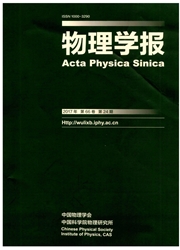

 中文摘要:
中文摘要:
测量设备无关量子密钥分发系统可以免疫任何针对探测器边信道的攻击,并进一步结合诱惑态方法规避了准单光子源引入的实际安全性问题。目前实验中一般采用弱相干光源,但是该光源含有一定比例的空脉冲和多光子脉冲。本文针对弱相干光源的具体特性,采用量子力学的描述,将各个器件进行量子化处理,并同时考虑探测器的具体性能参数的影响,分别给出了通信双方各自发送的脉冲含有特定光子数时产生的成功贝尔态和错误贝尔态的概率公式,从理论上对相位编码和偏振编码测量设备无关量子密钥分发系统的误码率进行了定量分析,分别推导并模拟了通信双方采用的平均光子数对称和不对称时误码率随传输距离的变化情况,结果表明在偏振编码Z基中,多光子脉冲不会引起误码;在偏振编码X基和相位编码中,受多光子影响,产生的误码率较大。对于不同的编码方式,误码率均随传输距离的增加有不同程度的升高,长距离传输时,平均光子数越小,产生的误码率越大;在偏振编码X基和相位编码的短距离传输中,相对于对称,通信双方采用的平均光子数不对称时产生的误码率较大。
 英文摘要:
英文摘要:
A measurement-device-independent quantum key distribution (MDI-QKD) protocol is immune to all detection side-channel attacks and guarantees the information-theoretical security even with uncharacterized single photon detectors. A weak coherent source is used in the current MDI-QKD experiments, it inevitably contains a certain percentage of vacuum and multi-photon pulses. The security issues introduced by these source imperfections can be avoided by applying the decoy state method. Here, through modeling experimental devices, and taking into account the weak coherent source and the threshold detectors, we have evaluated the gain, the probability to get successful Bell measurement and incorrect Bell measurement, and the quantum bit error rate (QBER), given a practical setup. In our simulation, we show how QBER varies with different transmission distances in the cases when the average photon numbers per pulse from Alice and Bob are symmetric and asymmetric. Result shows that the multi-photon pulses do not cause error in the Z basis of polarization encoding scheme, but produce a large QBER in phase encoding scheme and in the X basis of polarization encoding scheme. QBER is affected by the dark count rate and the system optical error associated with the multi-photon pulses. For different encoding schemes, QBER caused by each kind of average photon numbers from Alice and Bob increases to different degrees with the transmission distance, and finally is close to 50%. With the increase of the transmission distance, the average photon number per pulse decreases and the fraction of the dark count rate causing QBER gradually increases. Under the same effect of the dark count rate, the smaller the average photon number per pulse, the bigger the QBER. After a certain transmission and at the same transmission distance, the QBER is largest when average photon numbers used by Alice and Bob are both smallest. For the short distance transmission of phase encoding scheme and the X basis, we find that QBER is larger when aver
 同期刊论文项目
同期刊论文项目
 同项目期刊论文
同项目期刊论文
 An autobias control system for the electro-optic modulator used in a quantum key distribution system
An autobias control system for the electro-optic modulator used in a quantum key distribution system Influence of digital averaging on the signal-to-noise improvement ratio of temperature control syste
Influence of digital averaging on the signal-to-noise improvement ratio of temperature control syste New approach for normalization and photon-number distributions of photon-added (-subtracted) squeeze
New approach for normalization and photon-number distributions of photon-added (-subtracted) squeeze 期刊信息
期刊信息
